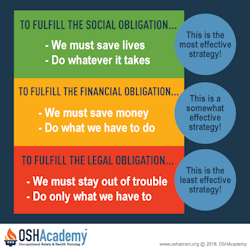Six Key Questions
- Why is the decision-maker doing safety?
- The social obligation: You may want to emphasize improved morale, public relations. Common in a humane corporate culture.
- The financial obligation: You may want to emphasize the costs/benefits. Common in an achievement-driven culture.
- The legal obligation: You may need to emphasize possible penalties if corrections are not made. Common in a fear-driven culture.
- List the possible decision-maker objections.
- List the arguments that are most likely to be successful against those objections.
- As a last resort, review employer obligations under administrative law.
It's important to know what is motivating the decision-maker. Is the decision-maker doing safety to fulfill one or more of the following imperatives?
Employer motivation will determine the nature of the objections to the recommendations you submit. What are possible objections the decision-maker might raise? Whatever they might be, it's important you understand their motivations so that you are better prepared with responses that satisfy the decision-maker's needs.
Knowledge Check Choose the best answer for the question.
7-8. Which obligation emphasizes possible penalties if corrections are not made?
You forgot to answer the question!

